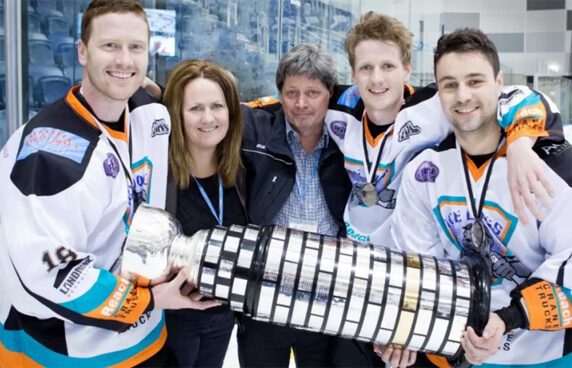Warriewood local Mark Stephenson has been recognised for his long service to ice hockey, but says there’s much more to the story
When Warriewood resident Mark Stephenson introduces himself, he starts by saying he is a staff member of AstraZeneca. “We saved the world from a global pandemic!” But Mark is also an integral presence in the world of Australian ice hockey, having been recognised with a Sport NSW Distinguished Long Service Honour earlier in the year.
“I’m the national coaching director for Ice Hockey Australia and I have been for the last 12 years. And prior to that, I was the state coaching director for Ice Hockey NSW,” Mark explains. “So, anything to do with the fundamentals of accreditation of coaching, coaching education material, things of that nature, is my mandatory role. Obviously, there’s always other aspects to it and I’ve coached for many years, since about 1980, both at local, state and at world championships as well.”
Mark has had many achievements coaching the Sydney Sirens in the Australian Women’s Ice Hockey League, the Sydney Ice Dogs in the Australian Ice Hockey League, and several state teams at the National Ice Hockey Championships.

Mark (centre) with his family, who are all involved in ice hockey
Mark’s whole family has been involved in ice hockey, his sons all playing and even travelling internationally for the sport alongside him. “To be honest, having played a minority sport as an amateur for most of my life, when my children grew up, we tried to get them into every conceivable sport. I was happy for them as long as it wasn’t ice hockey.
“They used to watch Daddy’s rec team and one year, they missed out on soccer registration. They started playing hockey and in the end, they went to some pretty amazing places.”
Since he started playing as a child out at Canterbury, Mark often visited the old Narrabeen ice rink, which closed in the late 1990s.
“It’s only the last 10 years that I’ve moved to Warriewood, and one of the things that was ironic was while I was growing up, one of the teams that I played against was out at the Narrabeen Ice Rink,” Mark says. “Whenever we’d jump in the car and we’d drive down the Wakehurst Parkway, we’d be thinking, ‘Oh my God, we’re just going to get killed here.’ One day we lost something like 22-7, we got totally trashed, it was embarrassing.”
Mark is keen to emphasise the community work that led to the Australian ice hockey scene developing to where it is today. “I don’t think the real story here is me. The Narrabeen rink was developed by a gentleman by the name of Dickie Mann, a Holocaust survivor from World War II. When the Narrabeen rink was strong, our sport was strong, and it grew the numbers. Now being a local, I feel like I pale into insignificance against that,” Mark says.
Ice Hockey Australia has street hockey programs he would like to roll out to the Northern Beaches to ‘give kids the feel of having a ball on the end of their stick,’ but Mark still encourages anyone who wants to build an ice rink to give him a call.
“I always tell people I’m a little bit lazy, because (on the ice) all I have to do is do one push and I can travel about 30 metres, whereas I find it quite painful at my age to walk 30 metres. I’d love to be near a local rink where I can take my grandchildren and teach them how to skate and enjoy it,” he says.
Mark was one of 19 recipients of the yearly NSW Community Sports Awards which recognise individual administrators who have demonstrated extraordinary unwavering dedication to nurturing and promoting sport in their communities for over 25 years.








